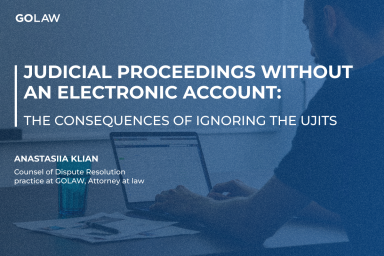The Draft Law on Taxation Features during Martial Law: What Changes are Suggested?
Contents
On July 18, 2024, the Verkhovna Rada of Ukraine registered Draft Law No. 11416 “On amendments to the Tax Code of Ukraine and other Laws of Ukraine regarding taxation features during the period of martial law” (hereinafter referred to as the “Draft Law”).
It contains a significant number of new provisions, and it should be noted that if the Draft Law is adopted in its currently published form, the tax burden on businesses will increase, and some aspects of interaction with the tax authorities will become stricter.
Below we suggest examining the key changes according to the Draft Law.
Updating Rules on Military Levy Collection
If the Draft Law is adopted, Ukrainian businesses will face a significant expansion in the application of this levy and an increase in its rate.
Specifically, the document provides for the following:
- increasing the military levy rate to 5% on wages, dividends, and other income of individuals;
- taxing the entire income of legal entities (regardless of the tax system) with a military levy at a rate of 1%;
- the payment of the individual entrepreneurs on the 3rd group of the simplified tax system a military levy of 1% of their income;
- the payment of the individual entrepreneurs on the 1st, 2nd and 4th groups of the simplified tax system a military levy at a rate of 5% of twice the minimum wage as of January 1 of the reporting year (currently, this tax amounts to 710 UAH);
- taxing the cost of a vehicle acquired in ownership, subject to the first state registration, with a military levy at a rate of 15%;
- charging a military levy at a rate of 5% on the cost of mobile communication services paid by users;
- taxing income from the sales of jewelry (household) items with a military levy at a rate of 30%.
Advance Payments of Corporate Income Tax for Taxpayers Engaged in Retail Fuel Sales
The Draft Law suggests establishing a requirement for such business entities to make monthly advance payments of corporate income tax.
The advance payment amount will be 0,5 of the minimal wage set as of January 1 of the reporting (tax) year calculated per 1 cubic meter of storage tanks for gasoline, diesel fuel, and liquefied gas located at the place of fuel retail that registered in the Unified Register of Licensees and Fuel Circulation Places. Currently, this amounts to 3550 UAH per 1 cubic meter of the specified tanks.
The amount of advance payments paid will reduce the corporate income tax obligations calculated for the reporting period at a base rate.
At the same time, if the amount of advance payments made during the year exceeds the amount of the tax obligation accrued for that year, it will not reduce the tax payable for the subsequent periods.
Additionally, the amounts of advance payments made cannot be refunded as overpaid or mistakenly paid tax or credited toward the payment of other charges.
Also, the timeliness and completeness of the payment of the specified advance payment will be subject to desk audits.
Minimum Personal Income Tax Base
According to the proposed changes, until the last day of the month in which martial law is terminated, the minimum base for personal income tax on salaries can be established by decisions of village, settlement, and city councils for the respective territories. However, this base must be no less than the minimum wage set by law for a monthly tax (reporting) period.
In cases where salaries are accrued (paid) at amounts less than the minimum base, the tax agent is required to independently calculate and pay to the budget the difference between the tax calculated on the established minimum base and the tax withheld from the actually paid salary, using their own funds.
At the same time, no maximum thresholds or other limitations of the specified possibility to set the tax base are expected. Consequently, this may result in setting in certain areas a minimum base significantly higher than the actual salaries of individuals, forcing employers to cover the difference in personal income tax.
Electronic Communication
The Draft Law suggests introducing electronic correspondence between tax authorities and certain taxpayers through an electronic cabinet. These taxpayers include:
- large taxpayers;
- VAT payers;
- excise tax payers;
- financial agents in cases provided by law;
- e-residents.
The listed taxpayers will not be able to submit a request for refusal to receive documents through the electronic cabinet, and all letters sent by the tax authorities via the electronic cabinet will be considered duly delivered (provided they were sent in accordance with the relevant requirements).
Therefore, the range of business entities that will need to diligently check their electronic cabinet is quite broad.
Conducting Inventory during Tax Audits
The Draft Law includes among the responsibilities of taxpayers the requirement to conduct an inventory of fixed assets, inventory holdings, and cash balances at the request of the tax authority during an audit. This inventory must be carried out within the time frames and scope specified in the request and in the presence of tax officials.
It is worth noting that under some provisions of the tax legislation, tax authorities already had the right to request such an inventory and be present during it, although their presence was not mandatory.
However, the Draft Law now provides for making the presence of tax officials mandatory during the specified inventory and establishing liability in the form of property seizure for refusing tax officials’ presence during the inventory.
To lift the seizure imposed for this reason, the taxpayer will need to conduct the inventory with tax officials allowed to be present. It should be noted that the legislation does not specify the time frames within which tax officials must appear for the inventory. Furthermore, the presence of tax officials is a right they may choose not to exercise, thereby potentially prolonging the duration of the asset seizure imposed for refusal of their presence at the inventory.
If the audit during which the tax authority requests an inventory relates to VAT reimbursement, and the taxpayer fails to comply with the requirement to conduct the inventory and/or allow tax representatives to be present, the amount declared by the taxpayer for reimbursement will be reduced and credited to the tax credit of the next reporting (tax) period.
Other Changes
The Draft Law also suggests other new provisions, including:
- imposing an excise tax on beverage producers and importers at the rate of 0.1 euros per liter of beverage (including water, mineral, and carbonated waters with added sugar or other sweetening or flavoring substances);
- requiring taxpayers who regain the ability to fulfill their tax obligations during martial law to inform the tax authority. If the taxpayer fails to do so, the tax authority will have the right to independently decide that the taxpayer has regained this ability;
- removing the provision from the Tax Code that exempts from VAT the import or export of goods outside the customs territory of Ukraine with a customs value not exceeding the equivalent of 150 euros. It is also suggested to reduce the value of goods imported into Ukraine and exempt from VAT from 150 to 45 euros.
If you have any questions regarding the changes provided by the Draft Law and the potential impact on your business, please contact the specialists at GOLAW, and we will provide you with the necessary answers.

Viktoriia Bublichenko
Partner, Head of Tax, Restructuring, Claims and Recoveries practice, Attorney at law
- Contacts
- 31/33 Kniaziv Ostrozkykh St, Zorianyi Business Center, Kyiv, Ukraine, 01010
- v.bublichenko@golaw.ua
- +38 044 581 1220
- Recognitions
- IFLR1000 2024
- IFLR1000 2024
- ITR World Tax 2025
Get in touch
To get a consultation, please fill out the form below or call us right away:Sign up to be aware
New achievements are inspired by information. GO further, don’t miss out GOLAW news and legal alerts
Our expertise
-
- Antitrust and Competition
- Banking and Finance
- Compliance, Corporate Governance and Risk Management
- Corporate and M&A
- Criminal and White Collar Defence
- Defense in Anti-corruption procedures and regulations
- Labor and Employment
- Natural Resources and Environment
- Government Relations (GR)
- Insolvency and Corporate Recovery
- Intellectual property
- International trade
- Legal support of business and private Сlients in Germany
- Litigation and dispute resolution
- Private clients
- Real Estate and Construction
- Energy and Natural Resources
- Restructuring, Claims and Recoveries
- Martial Law
- Tax and Customs
-
- Agribusiness
- Aviation
- Chemical industry
- Engineering, Construction and Building Materials
- Natural Resources and Environment
- Financial institutions
- IT and AI
- Industry and manufacturing
- Healthcare industries, Life sciences and Pharmaceuticals
- Media, Entertainment, Sports and Gambling
- Retail, FMCG and E-Commerce
- Transport and Logistics
We use cookies to improve performance of our website and your user experience.
Cookies policy
Cookies settings







